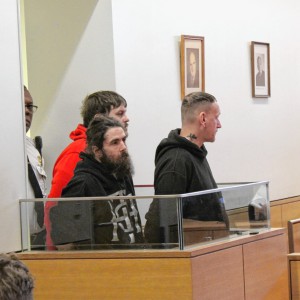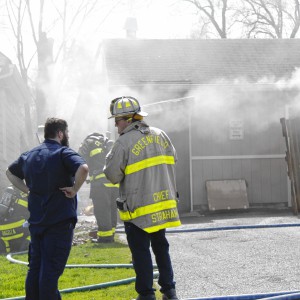My Turn: FirstLight’s grim obedience clause
| Published: 05-21-2023 8:39 PM |
There’s an ugly paragraph I call the “Obedience Clause” buried deep in the FirstLight Power’s Comprehensive Settlement Agreement sent to the Federal Regulatory Commission on March 31, 2023. It’s a pact meant to enshrine future ecosystem conditions on the impoverished Connecticut River here in Massachusetts for the next 50 years.
It’s a humiliating requirement agreed to by the U.S. Fish and Wildlife Service, National Marine Fisheries Service, Mass. Division of Fisheries and Wildlife — plus a handful of recreation outfits oddly tossed into the Fisheries, Aquatics and Flows negotiations at the last minute.
The overall document required public agency signatures on Canadian-owned FirstLight Power Resources’s financially stunted FERC relicensing bid for a crippled river ecosystem here for another half-century. But FirstLight’s little obedience clause also further requires the agencies to do what is essentially lobbying FERC for a ruinous private deal for flows from New England’s Great River.
“Upon notification by FirstLight of the need therefore, the other Parties shall provide written communications (or orally, in the event written communication is impossible to obtain due to reasons outside a Party’s control) of support in any administrative approval process that may be required for implementation of this Settlement Agreement or related articles of the New Project Licenses, subject to available Party resources and Regulatory Party authority and policy.”
What do their agency signatures require? When FirstLight says “Bark!”, you bark. When they say “Speak!” you speak. When FirstLight says “Beg!” you ask when and how and start lobbying FERC whenever corporate says “Go!”
FERC loves to sit on the sidelines, favoring private interests over environmental enforcement and public rights — as they rubber-stamp licenses after ponderously long corporate license extensions like FirstLight’s, which expired back on April 30, 2018. So much for the public trust.
It’s a grim, great coup for FirstLight and their Canadian capital investment owners, PSP Investments. More grimly, it’s a shameful capitulation of our agencies. Their signing will only further help starve the blisteringly withered, mechanically reversed river ecosystem in Massachusetts of ancient, natural downstream flows, channel restoration and meaningful public compensation for the daily river stopping, reversing, fish-killing chaos and obliteration of the physical and biological functions of this four-state river ecosystem by the Northfield Mountain Pumped Storage Station here.
Article continues after...
Yesterday's Most Read Articles
 New owners look to build on Thomas Memorial Golf & Country Club’s strengths
New owners look to build on Thomas Memorial Golf & Country Club’s strengths
 Orange man gets 12 to 14 years for child rape
Orange man gets 12 to 14 years for child rape
 Greenfield Police Logs: April 2 to April 8, 2024
Greenfield Police Logs: April 2 to April 8, 2024
 One Greenfield home invasion defendant up for bail, other three held
One Greenfield home invasion defendant up for bail, other three held
 Fire scorches garage on Homestead Avenue in Greenfield
Fire scorches garage on Homestead Avenue in Greenfield
 Cleary Jewelers plans to retain shop at former Wilson’s building until 2029
Cleary Jewelers plans to retain shop at former Wilson’s building until 2029
On May 9, 2023, I filed a “Motion to Intervene” with the Federal Energy Regulatory Commission against relicensing the FirstLight-branded, Delaware tax-sheltered Northfield Mountain Pumped Storage Station for a new half-century, stating:
“NMPS is a river robbing, energy-wasting machine whose daily operations have now crippled critical miles of the first National Blueway in the United States for half a century. It should not be in daily operation under current federal CWA [Clean Water Act] and state standards, and unless and until it can be shown to come into compliance with those standards, it be cannot relicensed by FERC under FirstLight’s proposed conditions. Regardless of any state and federal signatory stakeholder endorsements attached to FirstLight’s relicensing requests, allowing Northfield Mountain’s crushing aquatic impacts and energy waste is not in the public interest and runs contrary to landmark federal and state environmental law.”
The very next day those half-dozen recreation outfits, including the Appalachian Mountain Club, trumpeted their support in a letter to FERC. The Mass. Division of Fisheries and Wildlife obediently expressed their ardor in their own FERC letter the day following. Meanwhil,e the U.S. Fish and Wildlife Service and National Marine Fisheries had already made good on their obedience pledge via a get-it-over-with lobby letter to FERC weeks ago.
Northfield wasteful, you ask? Well, the later into this now 11-year FERC relicensing monolith, the more facts come squeaking out — after agency sign-offs. Here’s FirstLight’s new quote filed to FERC on the massively wasteful, grid-parasitizing operation of their buy-low/sell high energy profit model for Northfield, in place for 51 years now:
“The average annual generation consumed by the Northfield Mountain Project under baseline conditions. The average ratio of pumping (1,189,640 MWh average from 2011-2019) to generating (889,845 MWh average from 2011-2019) is approximately 1.34, meaning it takes 34% more energy to pump than to generate.”
Northfield squanders over one-third more energy than it regenerates. It’s never produced a single watt of clean, renewable energy. It doesn’t make its own power — it can’t. It is an electric money machine, reselling energy pulled from the grid to suck the river backward and uphill, later sending it back as the twice-produced, peak-priced juice we pay for in a dead river and monthly charges on energy bills.
Today, NMPS is basically a natural gas plant — by far the leading grim energy source fueling ISO-New England’s corporation-dominated power structure. In the future, FirstLight/PSP Investments hopes to clear its Connecticut River-crippling profits by sucking grid wind power from Atlantic Ocean turbines to run New England’s Great River into the ground — in turn, reselling that dead river juice back out to energy-hungry cities on the coast.
Our agencies have sold out. Meanwhile, a prosecuting defender like Riverkeeper — who waged and won court battles against a pumped storage at Storm King Mountain on the Hudson decades back, never emerged here. That combination is how ecosystems are left to die.
Karl Meyer has been a stakeholder, intervenor, and member of the Fish and Aquatics Studies Team in the federal relicensing bid for Northfield Mountain since 2012. Meyer is a member of the Society of Environmental Journalists. He lives in Greenfield.

 Connecting the Dots: In what world do you want to live?
Connecting the Dots: In what world do you want to live? Jessica Zhang: Weigh your choices — Solar power a better alternative
Jessica Zhang: Weigh your choices — Solar power a better alternative My Turn: Saving planet Greenfield
My Turn: Saving planet Greenfield Gary Seldon: Solar Roller Earth Day River Ride
Gary Seldon: Solar Roller Earth Day River Ride
